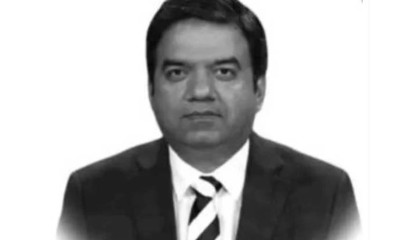Paramount has removed Bob Bakish as CEO — and it doesn’t have plans to fill the role. The company announced the news as part of its earnings results on Monday, which will leave Paramount reliant on a committee made up of three executives.
Pakistan
A game of chance
Punjab’s senate elections ended in a whimper. The lead up to the election was marked with plenty of hue and cry, angry statements, fears of votes being traded for money and a presidential reference that was sent to the Supreme Court.
Strange points were raised, such as a secret ballot that would be traceable and proportional representation was questioned. In the end, however, all members were elected unopposed. Not a single ballot paper was required. Enemies sorted out all matters between themselves.
A more pertinent lesson could not have been derived from the development. Political matters need not be taken to court. The wiliness and slyness that is a necessity in any political arena do not belong in the hallowed halls of law. In fact, they sully the sanctity of judicial houses.
Blots on our history, such as Justice Munir’s Doctrine of Necessity, Zulfiqar Ali Bhutto’s death sentence and Musharaff’s LFO have left deep marks. Future judges tried their best to wash out the stains. They did fade, but did not disappear.
Political chances suit only politicians. If after all the bad blood and trash talk that the opposition and government indulged in before sitting down to settle Punjab’s senate polls, anyone believes that either would not give or take an NRO, is incredibly naïve.
What happened in Punjab can be summarized in one sentence i.e. acceptable names got through, unacceptable ones didn’t. Quetta’s Abdul Qadir is one of the lucky few who have been approved of. When PTI Balochistan members objected to his ticket, Qadir switched over to Bap and became a member overnight. Zahoor Agha was brought in as a salve to soothe bruises but had less longevity than a tissue paper. He recanted right after his papers were filed, abdicating the polls in favor of Abdul Qadir. The chosen one is not selected by party workers, after all.
If not a fluke of chance, then what else can we call the (re)rise of former Premier, Yousuf Raza Gillani. At the center of the political battle that will be waged in the capital, Gillani told Maryam Nawaz that he knew of PTI lawmakers who will give him a vote in return for assurances of PML-N tickets in 2023. Consider that the three parties at the center of this particular smorgasbord are the biggest three in the country. The seekers are from the ruling PTI, the givers are from PML-N and the brokers of the deal are the PPP.
And consider how the Punjab settlement, such as it is, was authored by the PML-Q. With an increased likelihood of both the vote and the note disrupting proceedings, Pervez Elahi took it upon himself to manage affairs and bring them to a conclusion acceptable to everyone. He contacted sympathizers in all the major parties, settled the issue and in the process, managed to get a seat for PML-Q’s Kamil Ali Agha.
As for the contest between Gillani and Hafeez Sheikh, well, it might not be of much surprise to anyone if a few pawns here and there switch sides. This is not unprecedented. Here, parties are broken up and formed anew over a period of just 24 hours. If Gillani wins then of course the doors to a no-confidence move will be opened. And that will end the impression of government and establishment being on the same page. The million dollar question is, will that day finally come to pass?
Sports
Pakistan women set to clash with West Indies in 5th T20I match today
West Indies’ team has won three matches while Pakistan could secure one victory in the ongoing five-match T20I series.

Karachi: Pakistan women's cricket team is set to face off against the West Indies women's team in the fifth T20 international of their ongoing five-match series at Karachi stadium on Friday (today).
The match is scheduled to commence at 7:30 PM local time.
In the previous encounter, Pakistan emerged victorious over West Indies by eight wickets in the fourth match of the series, held in Karachi on Thursday. Opting to bat first, West Indies managed to score 84 runs, losing nine wickets in their allotted twenty overs. In response, Pakistan chased down the target with ease, reaching 85 runs for the loss of two wickets in 16.3 overs.
With this win, Pakistan narrowed the series gap, with West Indies currently leading 3-1.
Technology
Paramount CEO Bob Bakish steps down as merger inches closer
Paramount CEO Bob Bakish is stepping down as the company moves closer to a merger. A team of three executives will lead Paramount instead.

The new Office of the CEO consists of George Cheeks, the president and CEO of CBS; Chris McCarthy, the president and CEO of Showtime, MTV Entertainment Studios, and Paramount Media Networks; and Brian Robbins, the president and CEO of Paramount Pictures and Nickelodeon. Reports first emerged of Bakish’s potential departure on Friday.
Bakish has been with the company since 1997 and became CEO of Viacom in 2016. He remained in the position when Viacom and CBS Corporation merged in 2019 to form Paramount Global, guiding the company through the launch of Paramount Plus and its acquisition of Pluto TV. Bakish is also stepping down from Paramount’s board of directors.
For months now, Paramount has been in talks with several suitors that want to buy all or part of the company. It’s getting closer to a deal with Skydance Media, which has extended a final offer to merge with Paramount, according to a report from CNBC. The proposed deal involves Skydance paying a $3 billion cash infusion to buy back shares and pay debts, while also giving shareholders a larger stake than it offered previously, The New York Times reports. Paramount’s special committee still has to approve the deal.
A report from The Wall Street Journal suggests that Shari Redstone, the head of Paramount parent company National Amusements, and other board members haven’t been happy with Bakish’s leadership. As pointed out by the Journal, Paramount’s market value has dipped significantly since 2019, going from $25.3 billion to $8.4 billion.
“Paramount Global includes exceptional assets and we believe strongly in the future value creation potential of the Company,” Redstone says in a statement. “I have tremendous confidence in George, Chris and Brian. They have both the ability to develop and execute on a new strategic plan and to work together as true partners.”
Over the past few months, Paramount reported adding 3.7 million Paramount Plus subscribers, bringing its total number of members to 71 million globally. The service’s revenue also increased by 51 percent year over year, while overall advertising saw a boost thanks to the 2024 Super Bowl.
Regional
Cholera is making a comeback — and the world doesn’t have enough vaccines
“A billion people at risk”: How worldwide cholera outbreaks are threatening lives.

Amid a global resurgence of cholera, the world is fighting with one hand tied behind its back.
The global stockpile of the oral cholera vaccine — a supply whose needs are difficult to predict and fill anyway — has dwindled to nearly nothing after the Indian drug manufacturer that produced about 15 percent of the world’s supply stopped making the vaccine last year. While other companies are setting up new production capacity, the stockpile is now effectively nonexistent. Demand is so great that as soon as doses are produced, they must immediately ship to one of the world’s current cholera hot spots.
This crisis is symptomatic of a larger problem: the persistent lack of political will and financial investment to dramatically reduce cholera deaths.
Cholera flourishes in areas where there is contaminated water, poor sanitation, and people living in crowded conditions — like the city of Rafah, currently home to more than 1 million Palestinians displaced by Israel’s war in Gaza. Cholera has not yet been detected there, since no one from outside Gaza can bring it in, but an outbreak would be catastrophic given the decimation of Gaza’s health care system and the lack of access to humanitarian goods like clean water and medication.
The disease is typically spread when an infected person or people contaminate a water source by defecating in or near it. People get sick after drinking the contaminated water, suffering from acute diarrhea and vomiting — which can, without treatment, kill an infected person within a day.
It’s a disease that rich countries with clean water and good sanitation infrastructure do not have to worry about anymore. But cholera cases are rising worldwide now after a period of decline from 2017 through 2021, according to the World Health Organization’s cholera team leader Philippe Barboza. There are currently active cholera outbreaks in Zambia, Mozambique, Sudan, the Democratic Republic of the Congo, Syria, Ethiopia, Somalia, Zimbabwe, and Haiti.
“Once it is there in these situations, because of the very poor water and sanitation and hygiene situation, it can spread like wildfire,” Paul Spiegel, director of the Johns Hopkins Center for Humanitarian Health, told Vox.
As many as 143,000 people die from this preventable disease each year — which could even be an underestimate, since some countries do not have the capacity to detect or compile data on cholera cases. According to some metrics, it is becoming more fatal because many infected people do not have adequate access to health care. Concurrent outbreaks throughout the world are straining the global health sector’s resources to respond.
“It’s a really horrible way to die,” Mohammad Fadlalla, an Ohio-based physician who volunteers with Medecins Sans Frontieres and has responded to multiple cholera outbreaks, told Vox.
With the increase in outbreaks and limited countermeasures, particularly vaccines, “We are talking about a billion people at risk” in the immediate term, Barboza said. “And this is an underestimate. This is a very conservative estimate.”
Why aren’t there enough cholera vaccine doses?
There are a few intersecting crises that have led to cholera’s comeback and the world’s limited capacity to combat it. One pivotal moment came in 2020, when Shantha (now Sanofi India), a fully owned subsidiary of French pharmaceutical company Sanofi based in India, announced that it would stop manufacturing its oral cholera vaccine at the end of 2022.
“We took this decision in a context where we were already producing very small volumes versus the total demand for cholera vaccines and in the knowledge that other cholera vaccine manufacturers (current and new entrants) had already announced an increased supply capacity in the years to come,” Sanofi told the Guardian in 2022.
The company said at the time that it had shared information about how its vaccine was manufactured with public health partners like the International Vaccine Institute (IVI), which has transferred the vaccine technology to new manufacturers.
But those contingencies weren’t enough to offset a total shutdown by the company that was manufacturing about 15 percent of the global vaccine supply depending on the year, as Jerome Kim, director general of the IVI, told Vox. That left just one other manufacturer, South Korea’s EuBiologics, in the market as global cholera cases surged.
“WHO has contacted [Sanofi] several times to ask first to increase [vaccine production], second to maintain, and third, to postpone their decision,” Barboza said. “So we have tried all the possible things and the rationale of [Sanofi is], ‘Oh, no, there will be other manufacturers that are coming.’”
In an email to Vox, Sanofi said that the decision to exit the cholera vaccine market was not about profitability, but rather based on an understanding that EuBiologics would increase its output and other manufacturers would enter the market.
EuBiologics will produce as many as 50 million doses of an oral cholera vaccine this year. The WHO announced in April that it approved a simplified, but still effective, version of the present formula for use, which will help mitigate the vaccine shortage.
The world has already been forced to start rationing vaccine doses. In 2022, the WHO recommended halving the vaccine dose from two to one, which downgrades the vaccine’s efficacy but does offer protection for a year or more, and obviously increases the number of people who can receive some protection with limited supplies. Last year, all of the 36 million regimens were distributed to 72 million people to take one dose each. Today, with only EuBiologics now producing a cholera vaccine, doses are allocated as soon as they are made to one of the areas with an active outbreak, said Derrick Sim, managing director of vaccine markets and health security at Gavi, the international vaccine alliance.
Because of the global shortfall, there are no vaccine doses available for preventive campaigns that would keep cholera out of communities in the first place. And absent an international commitment to improve the water supply and sanitation in poor countries at risk for cholera outbreaks — an approximately $114 billion yearly commitment — vaccination would be a powerful tool for preventing sickness and death from cholera in areas where outbreaks could occur.
There are some important developments in vaccine technology in the pipeline, such as a temperature-stable pill form that would be much easier to transport and administer than the current liquid form, which must be kept between 2 and 8 degrees Celsius. At least three companies are currently working to develop new cholera vaccines, but they won’t be on the market until at least the end of 2025, and potentially years later. Gavi, which supports vaccine programs in developing countries and has contributed to the vaccination of nearly 1 billion children since its founding in 2000, is also working with smaller manufacturers in developing countries in Africa to bolster the global supply and produce the vaccine closer to where it will ultimately be used, Sim said.
But developing cholera vaccines — from research to improve them to transferring the vaccine technology to new manufacturers, from clinical trials to purchasing and distributing them — also requires money. The WHO budgeted about $12 million for its cholera vaccination efforts last year, but that number will need to increase as cases do.
That could potentially help address some of these supply issues — but it also highlights why they exist in the first place.
“The big manufacturers are not interested in investing in a vaccine that only the poor countr[ies] can buy,” Barboza said, “and that will cost only $1.50 or $1 per dose.”
Why are cholera cases rising in the first place, in the 21st century no less?
At the time Sanofi decided to exit the cholera vaccine market in 2020, cholera was trending downward after a 20-year high in 2017. The Global Task Force for Cholera Control — a collaboration between the WHO, GAVI, and other stakeholders — had released a road map to reducing cholera deaths by 90 percent by 2030, and poor and developing countries where cholera is endemic or an active concern were implementing national cholera vaccination plans.
In retrospect, experts believe the world missed an opportunity to work aggressively toward prevention, an effort that would have been aided by Sanofi’s continued production of its cholera vaccines.
But Covid-19, which diverted resources and attention away from most other global diseases including cholera; an increase in displacement due to violence and conflict; and extreme weather events caused by climate change that both displace people and make environments more conducive to cholera have combined to allow the disease to spread more rapidly.
Four of the five worst years for cholera in recent history have come since 2017.
This is all the more concerning because cholera is fairly simple to prevent, with the supplies to provide clean drinking water and sanitation. It’s easy to treat, too: All it takes to cure cholera in most cases is clean water and oral rehydration salts, antibiotics in the worst-case scenarios. With proper medical intervention, no one should die from it.
In situations of extreme instability like in Sudan, or where the medical sector has been decimated as in Gaza, those interventions become more challenging.
And while some countries have long had routine cholera outbreaks, it’s not always easy to predict when or where they’ll hit, or how big they will grow, because contaminated water sources and infected people can cross borders, as likely occurred in Lebanon in 2022. Cholera is common in neighboring Syria, where the Assad regime has decimated local infrastructure and displaced hundreds of thousands of people. Though Lebanon had not experienced an outbreak since 1993, conditions were ripe for it. Years of government corruption and incompetence have led to a breakdown in public infrastructure including health care and sanitation — all of which helped trigger the outbreak in 2022. That outbreak saw at least 6,000 confirmed and suspectd cases.
In August 2023, Fadlalla was responding to an outbreak in Al Qadarif, Sudan, which has been in a devastating civil conflict for a year now.
“A lot of the governmental institutions were [at the time] eight months without their people getting paid their salaries, and the bureaucracy was not really functioning or operating,” he said. “And this is including the Ministries of Health. The whole medical sector was not getting paid, supplies were not getting restocked.”
Climate change and the conflict and displacement related to it also significantly contribute to the uptick in cholera outbreaks, according to experts Vox spoke with. Higher temperatures and changing weather patterns make the environmental conditions ripe for outbreaks in new places unused to the disease.
But climate change is not going to be reversed any time soon, nor is the global community going to commit to improving sanitation in developing countries or mitigating displacement. So in the meantime, vaccines remain one of the most important ways to prevent cholera deaths.
“It’s not that nothing is happening,” Barboza said. “There are a lot of things that are happening, but are they acting fast enough, with enough money?”
-
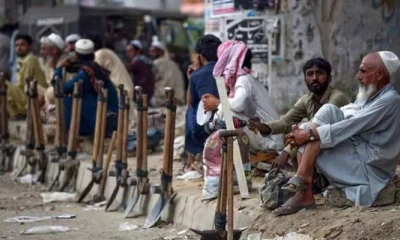
 Pakistan 2 days ago
Pakistan 2 days agoInt'l Labour Day being observed across country today
-
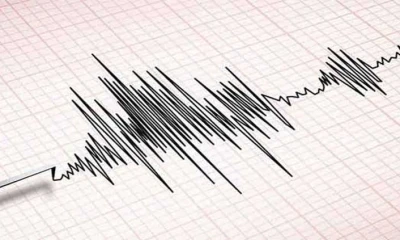
 Regional 8 hours ago
Regional 8 hours agoMagnitude 4.2 quake hits Turbat in Balochistan
-
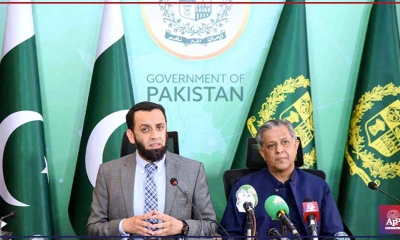
 Pakistan 23 hours ago
Pakistan 23 hours agoPM's Saudi Arabia visit to deliver positive results in few months: Tarar
-

 Pakistan 2 days ago
Pakistan 2 days agoZardari meets MQM leadership, discusses law and order situation in Karachi
-

 Technology 1 day ago
Technology 1 day agoAI could risk 17pc of jobs in Saudi Arabia: experts
-
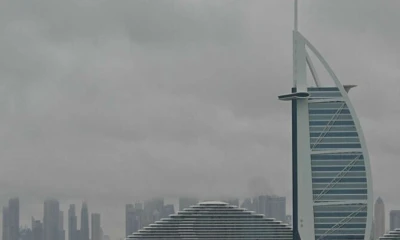
 Pakistan 20 hours ago
Pakistan 20 hours agoPIA suspends flights to Dubai, Sharjah amid return of heavy rains
-

 Pakistan 2 days ago
Pakistan 2 days agoGovernor KP Ghulam Ali meets Nawaz Sharif
-

 Sports 1 day ago
Sports 1 day agoPakistani squad for Ireland, England series announced


